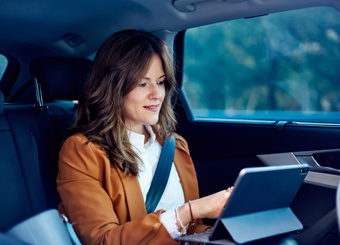HMRC: Business Travel & U.K Tax
HMRC stands for Her Majesty’s Revenue and Customs. It is the British equivalent of the Internal Revenue Service (IRS) in the United States and is the national tax authority in the United Kingdom. The agency was formed in 2005 in consequence of the merger of the Inland Revenue and the Board of Customs and Excise. It administers all national direct and indirect taxes, enforces tax laws and collects revenues. This guide explains what the HMRC does and what it expects from companies engaged in business travel in order to keep “the taxman” happy.
Understanding what HMRC does
The HMRC is responsible for collecting all direct and indirect taxes in the U.K. This includes income tax, capital gain tax, corporation tax, value-added tax (VAT), inheritance tax, excise duties, stamp duty land tax, air passenger duty, and the climate change levy. It ensures that the taxation system is implemented as effectively as possible and that the public complies with its regulations.
The HMRC also makes sure that funds collected are transferred to the Treasury and readily available for funding of public services.
Business Travel and the HMRC
When it comes to business travel and managing expenses, employers who pay the travel costs of their employees have certain tax, National Insurance and reporting obligations. While the rules and regulations from HMRC aren’t very clear to everyone, they must nevertheless be respected.
To help you understand the expectations of the HMRC, we put together this guide to help UK businesses better navigate travel expenses. After going through this guide, this task should not feel so dreadful.
What are travel expenses?
Travel expenses are defined as the ordinary and necessary expenses of travelling away from home for a professional purpose. They include transport costs, meals and mileage expenses among others.
If these costs meet all of the requirements, companies may be able to claim tax relief on them.
This might be the case if the costs fall into these categories:
- Food and drink
- Congestion charges and tolls
- Parking fees
- Business phone calls and printing costs
- Mileage
- Public transport costs
- Hotel accommodation if an overnight stay is necessary
The company should be able to claim tax relief if all these costs occur during business travel.
However, there is a fine line between what is considered personal and business travel. According to HMRC, business travel only covers two types of journeys:
- Journeys that are part of an employee’s work duties (for example trips between appointments by a salesperson to a potential client)
- Journeys related to an employee’s attendance at a temporary workplace or site outside of their regular commute
What this means is that if travelling is your job, or if you have to visit a specific place to perform your job, this is considered business travel.
HMRC provides a thorough factsheet on employee travel expenses that you can read here
Permanent vs temporary workplaces
As we have seen, travel expenses when travelling to a place of work can be claimed, but when travel counts as commuting, they cannot be claimed. To avoid confusion, we will explain the core differences between what counts as travelling vs commuting.
In simple terms, commuting is the regular travel you make when going to your permanent workplace. In other words, according to the HMRC, your permanent workplace is where you spend more than 40% of your time and where you go at least once a week. Commuting there cannot be claimed for tax relief. There are, nevertheless, a few exceptions to this rule such as late-night taxis home.
However, if you are leaving for a sales meeting, a conference, or any other work-related trip, these trips are considered to be business trips and thus can be claimed. A temporary workplace is therefore a place to where employees go to perform short-term tasks.
Side note: If travel to a temporary workplace is not any different from your regular commute in time, distance or costs, you cannot claim relief for it. For instance, if you are heading to a client whose office is right next to yours, this will not count.
Travel expenses and working from home
Now that the sanitary crisis has forced thousands to work from home, “home”, in this case, becomes a workplace and trips to other workplaces become business trips.
If, however, employees are working from home because it is simply more convenient, any home-to-work trips count as ordinary commutes.
Common confusion areas
Now that we are clear on travel expenses, let’s look at a few areas of confusion for employees:
Meal and subsistence rates
If companies do not set limits on expenses, this would open the door for employee abuse. Fancy meals and expensive drinks would count as business costs.
In order to avoid this, HMRC has provided a list of meal allowance rates that work like a per diem standardized for all UK businesses. It also included the cost of accommodation.
This leaves employers with three choices:
- Use the amounts set by HMRC
- Negotiate another rate by HMRC, if the rates already provided do not meet the company’s needs
- Reimburse employees in full, no matter the cost, however, it must be noted that the amount reimbursed will only be tax-free up to the amount allowed by HMRC. Employers will have to pay tax on the difference.
Note: Expensya allows employers to set limits for business costs and alert employees who exceed the provided limits before submitting their expense reports.
Fuel rates
Just like with meals, HMRC has also standardised the amount employers can reimburse employees for fuel tax-free. Every vehicle has different efficiency expectations and fuel prices are in constant fluctuations, so instead of dealing with this case-by-case, HMRC has assigned advisory fuel rates for business travel. These rates apply in two cases:
When reimbursing employees for business travel performed in company cars
When employees need to repay the company for personal travel done in a company car
In both cases, these advisory fuel rates tell companies and employees exactly how much to expect to pay or receive per mile.
Employed, self-employed, or neither?
We would like to specify that in this article, we are specifically addressing companies and their full-time employees. Tax rights and obligations differ and depend on the employment status among other things. This post by the Low Incomes Taw Reform Group highlights the differences in great detail.
Managing Travel Expenses
Now that we understand travel expenses and how to keep HMRC happy, we need an automated solution to help keep us on track. Expensya is the app for you: Equip yourself and your company with the most comprehensive business expense management solution tailored to your needs and to those of your employees. Automate your entire process from payment to reimbursement, regardless of your company size.
Expensya offers automated accounting, self-managed expenses, intelligent validation and control, complete integration with your ecosystem, among several other features that will make managing business costs easier and less time-consuming.






